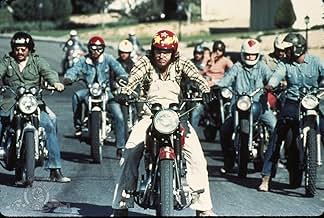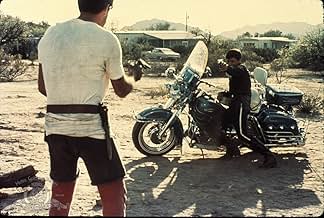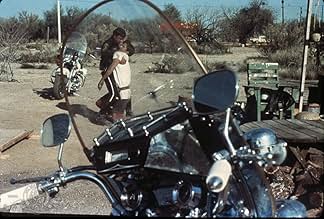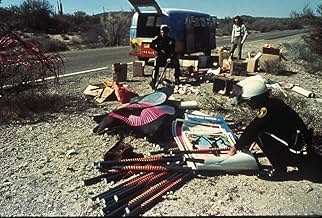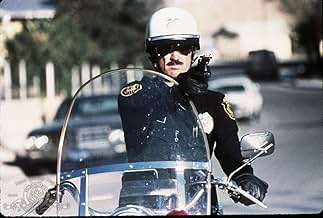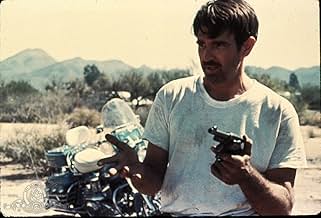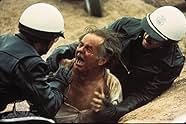CALIFICACIÓN DE IMDb
7.0/10
6.9 k
TU CALIFICACIÓN
El ambicioso pero diminuto policía en motocicleta John Wintergreen patrulla las carreteras de Arizona, anhelando ser ascendido a la división de homicidios.El ambicioso pero diminuto policía en motocicleta John Wintergreen patrulla las carreteras de Arizona, anhelando ser ascendido a la división de homicidios.El ambicioso pero diminuto policía en motocicleta John Wintergreen patrulla las carreteras de Arizona, anhelando ser ascendido a la división de homicidios.
- Dirección
- Guionistas
- Elenco
- Premios
- 3 nominaciones en total
Billy Green Bush
- Zipper
- (as Billy 'Green' Bush)
Elisha Cook Jr.
- Willie
- (as Elisha Cook)
Hawk Wolinski
- VW Bus Driver
- (as David J. Wolinski)
Melissa Greene
- Zemko's Girlfriend
- (as Melissa Green)
Opiniones destacadas
A requiem for the death of the American hero. No, this is not the plot--this is what the movie accomplishes. Do not mistake this existential parable for what may otherwise seem like a superficial counter culture exploitation flick--it is nothing of the sort.
Record producer Guercio's first (and last) effort at filmmaking (captured beautifully by the late cinematographer Conrad Hall) leaves the viewer wondering "where have all the cowboys gone?" John Ford taught us that the hero rode a white horse and did the right thing, even if it killed him-, and in this Vietnam era analogue, Blake is a five foot four inch leather clad motorcycle cop writing speeding tickets along a lonely two lane road cutting through monument valley. With high hopes and ideals, he aspires not only to do more but to become more...and for a while he succeeds. But the world is different, people are different, and the old heroes he admired are not just obsolete--they are extinct.
We are inexorably drawn through his disillusionment and our own to an ending that is sad, tragic, and inevitable.
Record producer Guercio's first (and last) effort at filmmaking (captured beautifully by the late cinematographer Conrad Hall) leaves the viewer wondering "where have all the cowboys gone?" John Ford taught us that the hero rode a white horse and did the right thing, even if it killed him-, and in this Vietnam era analogue, Blake is a five foot four inch leather clad motorcycle cop writing speeding tickets along a lonely two lane road cutting through monument valley. With high hopes and ideals, he aspires not only to do more but to become more...and for a while he succeeds. But the world is different, people are different, and the old heroes he admired are not just obsolete--they are extinct.
We are inexorably drawn through his disillusionment and our own to an ending that is sad, tragic, and inevitable.
Pigs! Killers! Fascists! Anti-cop? Not a chance. The locals took one peek at the script and threw the entire film crew out of their precinct, and escorted them to the edge of town and beyond. Wow! Sharp bikes. And movie title. Robert Blake is dead on right as the highway cop. He makes up for in height by what he delivers in toughness and compassion. Miss Jeannie Riley plays the love interest of both Blake and his superior. She has a lengthy bar room scene bordering on religious fervor and regret. Nifty character turns by veterans Elisha Cook Jr. and Royal Dano. The action sequences are staged and edited with flair. The great cameraman, Conrad T. Hall, experimented with the interiors, flooding the camera lens with smoke, diffused light and warped, fun house-type angles. Memorable moments one and two: Blake has two great dress-up scenes. The first involves his uniform and motorcycle. The second concerns his new threads when he makes detective. An old do-wop group, The Marcels, invades the soundtrack with the flip side of "Blue Moon." However, the best musical cue occurs at the end of the film. The closing song, "Tell me," written by the producer/director/composer, James W. Guercio, of this film, is a masterpiece of the rock genre. Worthy of an Oscar or Grammy, the song begins with a nod to Blood, Sweat and Tears, travels to Chicago and, later, dismounts in Spectorville. A road and a movie well traveled. And taken
Before he found himself on the wrong side of a murder investigation, Blake was noted for playing an unconventional cop on the TV show "Baretta" (and also the flip side as a brutal killer in the film "In Cold Blood".) Here he is a square peg trying to fit into a round hole as a California Highway Patrolman with dreams of more. At 5'4", he is a full head shorter than the shortest of his fellow motorcycle-riding fellow officers. Though his cohort Bush balances his days between sitting on his bike reading comic books and listening to the radio with pulling over anyone even remotely suspicious, Blake yearns to be a better cop than that and, ultimately, a detective. When (after a thoroughly gripping opening sequence) a man is found shot to death, Blake seizes the opportunity to piece the situation together and becomes the driver and right hand man to hotshot detective Ryan. As the pair attempts to solve the mystery of the man's death, their faults, attributes and insecurities are laid bare (notably in an extended scene with Riley, a barmaid who has known both men for a long time.) Finally, the truth of the death comes to light, but only after significant turmoil, carnage and some surprises. Blake is terrific in the lead. He perfectly captures the awkwardness mixed with ambition of his character. He has many memorable scenes, more than a few of which that poke fun at his size (though he was in great physical shape at the time.) Bush lends strong support as his rather amoral buddy. Ryan is splendidly authoritarian and paints a memorable portrait of a man who is a big shot (especially in his own mind) every time and everywhere except when it counts. He is perfect in the role. Cook has a very showy and effective role as a mentally challenged old man who discovers the body. Riley is effective in her sleazy, but sympathetic role, but her big scene does seem out of place somehow and shifts the focus of the movie more than it probably ought to. Dano, a strong character actor in countless TV and film projects, does an excellent job as a jaded coroner (a far cry from "Quincy M.D.", he not only eschews a surgical mask, but smokes a cigarette during the autopsy!) The film is gorgeously photographed and extremely creatively directed. It had to be way ahead of its time in terms of camera-work. The texture and atmosphere of the scenes is beyond most of what is cranked out today. It's also loaded with quirkiness and irony (some might say overloaded.) In any case, it's a unique viewing experience with many rewards for the patient and incisive viewer. There's also a motorcycle chase that rivals any of the best from this period. Like so many films, the only way it can be fully appreciated is in the widescreen format. The glimpses of Monument Valley are welcome and add much to the visual appeal of the film. The film isn't completely flawless, but it is highly memorable. The title refers to the make and color of a motorcycle.
Robert Blake has one of the best roles of his career as John Wintergreen, a dedicated motorcycle cop who yearns for more in life. What he'd really like is to be a detective - to wear a suit, a Stetson, and "get paid to think". He gets his chance when he discovers what first appears to be a suicide, but which John determines had to have been a murder. When John shows that he's got what it takes for the detective business, a charismatic hotshot named Harve Poole (Mitch Ryan) takes him under his wing, hiring John as a driver. What happens is that John becomes quite disillusioned watching Harve at work. John strives to be a good, kind, honest man, and doesn't like Harves' approach to law enforcement. A revelation regarding his colleague and good friend "Zipper" (Billy Green Bush) only adds to his dismay.
"Electra Glide in Blue" marked the filmmaking debut for James William Guercio, a veteran of the music industry who, with the help of ace cinematographer Conrad Hall, brings a lot of visual poetry which is not the action-packed murder mystery that some viewers might expect, or hope, it to be. That aspect of this film is never heavily stressed, as the movie clearly functions much more as a series of character vignettes. It's got a very deliberate pace to it, as it gives a number of its major players opportunities to tear into some meaty roles. Blake and Bush have fine chemistry and are quite engaging; you believe them as buddies. Ryan commands the screen whenever he's around; he's an excellent character actor (whom you may know best as the villain in "Lethal Weapon") who gives his role some real nuance. Royal Dano is a little under utilized as a grumpy coroner with whom John butts heads, but Jeannine Riley is wonderful as the barmaid Jolene, and Elisha Cook Jr. is as delightful as ever in the role of sad old sack Willie. Considering Guercios' background, it's not a surprise that some of the supporting players come from the music business - screenwriter Hawk Wolinski as the van driving hippie, and Peter Cetera and Terry Kath from the band Chicago; Cetera, amusingly, plays a scruffy biker. Keep a sharp eye out for Nick Nolte, uncredited as an extra in the commune scene.
The film turns out to be a moving meditation on personal ideals and loneliness, and leads to a shattering conclusion. This conclusion is much in line with films of this time period, and takes its time to play out. It's the kind of thing you don't easily forget.
It's not hard to see why this would have a following. It's interesting and it's entertaining, and well worth a look.
Seven out of 10.
"Electra Glide in Blue" marked the filmmaking debut for James William Guercio, a veteran of the music industry who, with the help of ace cinematographer Conrad Hall, brings a lot of visual poetry which is not the action-packed murder mystery that some viewers might expect, or hope, it to be. That aspect of this film is never heavily stressed, as the movie clearly functions much more as a series of character vignettes. It's got a very deliberate pace to it, as it gives a number of its major players opportunities to tear into some meaty roles. Blake and Bush have fine chemistry and are quite engaging; you believe them as buddies. Ryan commands the screen whenever he's around; he's an excellent character actor (whom you may know best as the villain in "Lethal Weapon") who gives his role some real nuance. Royal Dano is a little under utilized as a grumpy coroner with whom John butts heads, but Jeannine Riley is wonderful as the barmaid Jolene, and Elisha Cook Jr. is as delightful as ever in the role of sad old sack Willie. Considering Guercios' background, it's not a surprise that some of the supporting players come from the music business - screenwriter Hawk Wolinski as the van driving hippie, and Peter Cetera and Terry Kath from the band Chicago; Cetera, amusingly, plays a scruffy biker. Keep a sharp eye out for Nick Nolte, uncredited as an extra in the commune scene.
The film turns out to be a moving meditation on personal ideals and loneliness, and leads to a shattering conclusion. This conclusion is much in line with films of this time period, and takes its time to play out. It's the kind of thing you don't easily forget.
It's not hard to see why this would have a following. It's interesting and it's entertaining, and well worth a look.
Seven out of 10.
With those evocative images and that emotionally charged music, the final fifteen minutes are electrifying. It's all about America, and a terrible ten years of assassinations, Viet Nam, and countless other cultural strife. The film's ending is saying ... enough is enough. Let the healing begin. And as American culture bled in the late 1960s and early 1970s, so too did the emotional lives of individuals, like the hodgepodge of aggrieved characters that come and go in this story.
Seeing some of these people and listening to their individual stories of pain and suffering is John Wintergreen (Robert Blake), a by-the-book Arizona motorcycle cop, short on stature but tall on dreams. Sometimes with his partner Zipper (Billy Green Bush), "Big John" encounters these tormented souls, on the road mostly. That's his job. The film's story is an ode to the courage and nobility of ordinary Americans pained by reality with only their dreams to comfort them.
The film's disjointed plot begins with a killing. And this incident keeps the plot moving. But "Electra Glide In Blue" is mostly a character study, not a crime film. Color cinematography is quite good. Interior shots have lots of close-ups, even extreme close-ups. There's a lot of diffuse lighting. Exteriors are shot like a modern-day Western. Indeed, the look and feel of the film is similar in some ways to the old John Ford Westerns, like "The Searchers".
The plot is the main weakness of the film. Some parts are overplayed, like the chase scenes. There's a lack of continuity both in storyline and in visual elements. It's as if many scenes were shot impromptu, on the rush. And some of the acting is way over the top. However, Robert Blake does a fine job as America's everyday cop with his sense of principles.
This film reminds me in some ways of "Zabriskie Point" (1970), a counter culture film which has a powerful ending that helps to make up for earlier plot problems.
Based on a real-life event, "Electra Glide In Blue" gets off to a slow start. Even midway through, one wonders whether this film is going anywhere or has any point to it. It is, and it does. You just have to wait for that powerful ending and its cinematic message of a tormented America, from the point of view of one lonely cop, just doing his job.
Seeing some of these people and listening to their individual stories of pain and suffering is John Wintergreen (Robert Blake), a by-the-book Arizona motorcycle cop, short on stature but tall on dreams. Sometimes with his partner Zipper (Billy Green Bush), "Big John" encounters these tormented souls, on the road mostly. That's his job. The film's story is an ode to the courage and nobility of ordinary Americans pained by reality with only their dreams to comfort them.
The film's disjointed plot begins with a killing. And this incident keeps the plot moving. But "Electra Glide In Blue" is mostly a character study, not a crime film. Color cinematography is quite good. Interior shots have lots of close-ups, even extreme close-ups. There's a lot of diffuse lighting. Exteriors are shot like a modern-day Western. Indeed, the look and feel of the film is similar in some ways to the old John Ford Westerns, like "The Searchers".
The plot is the main weakness of the film. Some parts are overplayed, like the chase scenes. There's a lack of continuity both in storyline and in visual elements. It's as if many scenes were shot impromptu, on the rush. And some of the acting is way over the top. However, Robert Blake does a fine job as America's everyday cop with his sense of principles.
This film reminds me in some ways of "Zabriskie Point" (1970), a counter culture film which has a powerful ending that helps to make up for earlier plot problems.
Based on a real-life event, "Electra Glide In Blue" gets off to a slow start. Even midway through, one wonders whether this film is going anywhere or has any point to it. It is, and it does. You just have to wait for that powerful ending and its cinematic message of a tormented America, from the point of view of one lonely cop, just doing his job.
¿Sabías que…?
- TriviaFirst-time director James William Guercio wanted Conrad L. Hall to photograph this film, but Hall's salary was more than was budgeted for a cinematographer. Guercio reduced his own salary to $1.00 so he could secure Hall as the cinematographer.
- ErroresIn the final driving scenes, the van and the bike, supposedly driving along a long straight road, drive by the same distant butte at least three times.
- Citas
Harve Poole: Incompetence is the worst form of corruption.
- Versiones alternativasJohn Wintergreen is called John Winterberg in the German version.
- ConexionesEdited into The Our Gang Story (1994)
Selecciones populares
Inicia sesión para calificar y agrega a la lista de videos para obtener recomendaciones personalizadas
- How long is Electra Glide in Blue?Con tecnología de Alexa
Detalles
Taquilla
- Total en EE. UU. y Canadá
- USD 1,600,000
- Tiempo de ejecución1 hora 54 minutos
- Color
- Mezcla de sonido
- Relación de aspecto
- 2.39 : 1
Contribuir a esta página
Sugiere una edición o agrega el contenido que falta

Principales brechas de datos
By what name was Asfalto violento (1973) officially released in India in English?
Responda

